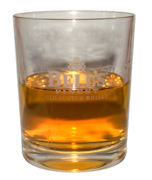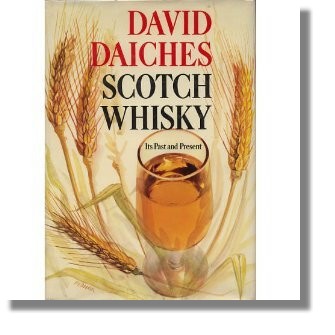

Whisky Connoisseur
Arthur J A Bell
Fine and Fiery


Whisky Connoisseur
Arthur J A Bell
Fine and Fiery

Despite the gross monopoly situation in whisky production, there is an ever growing band of aficionados worldwide who appreciate the true and unique flavours of malt whisky. There is a most important cultural revival in interest in this subject. Today there are many books, and regular articles, about whisky yet it was not always thus. A handful of writers in the first half of the century kept the subject alive. In 1969 Professor David Daiches CBE who had held academic posts in North America, England, and his native Scotland published "Scotch Whisky - Its past and present". Of all of his 45 books this one has been amongst the most influential. Like many other writers, I am under influence of Daiches!
This month I have been pouring through my whisky library, and would like to offer you some of my favourite observations by leading writers on the subject. Where better then to start than Daiches chapter on the origin and nature of Scotch whisky?
"The whisky distilled from malted barley in the manner perfected in the Scottish Highlands in the eighteenth century and still produced in essentially the same manner - what we call pot still Highland malt Scotch whisky - has proved to be inimitable outside Scotland. I have tasted a blended Scotch whisky produced in Canada from imported Highland malt whisky and locally produced grain whisky which was quite a respectable drink; but the true malt whiskies of Scotland remain a Scottish mystery in both senses of that word. I have been told by a friend who was in the Far East during the last war that he came across a bottle labelled "King Victoria Finest Scotchmans Whisko" allegedly made in Japan. There have been many attempts, both scrupulous and unscrupulous, to break Scotland's monopoly of Scotch. But the monopoly remains."
Neil Gunn the Caithness born writer, some of whose books such as "The Silver Darlings" (1941) are masterpieces, was a fine writer on whisky. Perhaps this was due to his experiences as a Customs officer in the Highlands before the last war. Here is his description of the birth of Scotch whisky: "Round the southern corner of the dun there was a field of barley all ripened by the Sun. In a small wind it echoed faintly the sound of the ocean; at night it sighed and rustled as the earth-mother thought things over, not without a little anxiety. It was cut and harvested and a sheaf offered in thanksgiving; flailed and winnowed; until the ears of grain remained in a heap of gold; the bread of life.
In simple ways the grain was prepared and ground and set to ferment; the fermented liquor was then boiled and as the steam came off it was by happy chance condensed against some cold surface.
And lo! This condensation of steam from the yellowish-green fermented gruel is clear as crystal. It is purer than any water from any well. When cold, it is colder to the fingers than ice.
A marvellous transformation! A perfect water, But in the mouth - what is this? The gums tingle, the throat burns, down into the belly fire passes, and thence outward to the finger-tips, to the feet, and finally to the head... Truly it was not water he had drunk; it was life."
Neil Gunn wrote about single malts in an era when they were almost unavailable outside the immediate area of their production. My personal favourite quote from him follows;
"These generous whiskies (the single ones), with their individual flavours, recall the world of hills and glens, of raging elements, of shelter, of divine ease. The perfect moment of their reception is after bodily stress - or mental stress if the body be sound. The essential oils that wind in the glass then uncurl their long fingers in lingering benediction and the whole works of creation are made manifest. At such a moment the basest man would bless his enemy."
I' m not sure that the well-fuelled Highlanders in battle, who had partaken of the native spirit before commencing their fight, actually blessed their enemies! Nonetheless what a lovely lyrical piece of Whisky writing.
A contemporary of Neil Gunn was Sir Robert Bruce Lockhart. A diplomat who served in Russia during World War One he was imprisoned after being accused of attempting to assassinate Lenin. During World War Two he was the head of British political propaganda, and then turned to full time writing. The love of his life was the Highlands of Scotland and the great whisky it produced. A Speyside man his magnum opus "Scotch - the whisky of Scotland in fact and story" was first published in 1951 and is currently in its seventh edition. In it he stated; "Scotch malt is a he-man's drink and goes with hard toil and strenuous exercise in the open air. Blended Scotch whisky is for weaker stomachs.
The very word Whisky is Celtic and comes from the Gaelic uisge-beatha which means water of life and, for better or worse, but mostly, I think for better, it has been to the Gaels what wine is to the Latin races of the Mediterranean. It is, too, or was, until English taxation put it beyond the reach of the humble man, essentially the drink of the people. The Lowland gentry and at least some of the Highland Lairds drank claret, but, as Scott righfly says, the character of a nation is not to be learnt from its fine folks." Sir Robert, writing after the last war, said: "Whisky is in mortal peril. On the day when, by long deprivation and desuetude, home Scots cease to drink Scotch whisky, the whole Scottish whisky trade will inevitably decline and other Whisky-drinking nations will make their own liquor which, whatever they may choose to call it, will not be Scotch. In a very real sense Whisky is the life's blood of the Scot."
I am glad that things have so massively improved since 1954, but if Whisky drinking readers have not heard of DIAGIO', they had better learn quickly. This is the name of the company formed by the merger of Guinness and Allied, that now owns so much of the industry. In France if wine production had been put into so few hands, there might have been another revolution!
Of all the modern writers on malt whisky my favourite is Charlie Maclean. Charlie trained as a lawyer, but does not practise. Instead he is the author of a number of books, and his "Pocket Whisky Book" published by Mitchell Beazley is one of the finest of its kind. Here he is on the making of Scotch whisky; "Scotch whisky is an elemental elixir. Its constituents are the earth, the water, the fire and the air of Scotland. Its only ingredients are barley, the quintessential harvest of the earth, pure water, imbued with the fugitive minerals of the land itself and a dash of yeast to ferment their brew. Fire malts the barley and raises the ethereal spirit in the still, and the fresh northern air often damp and chill, permeates the casks while the spirit matures and works a magic which is still not yet fully understood by chemists. Distilling developed as a branch of alchemy, and in truth the transmutation of the basic elements of barley into the golden liquid which has won the enthusiastic support of the entire world might still be accurately considered to be an alchemical process. More so since, despite deploying the very latest chemical and technological knowledge, nobody has been able to make Whisky with the same flavour characteristics as Scotch furth of Scotland."
Of all the millions of words that have been written about Whisky, none is more true in the sense of its liberating effect than Robert Burns: "Freedom and Whisky gang thegethir." And in the trillions of words that have been spoken over a glass or five of uisge-beatha is the auld saying; "There are two things that a Highlander likes naked, and one is malt whisky."
Return to Index of articles on Whisky by the Whisky Connoisseur, Arthur J A Bell
Where else would you like to go in Scotland?

